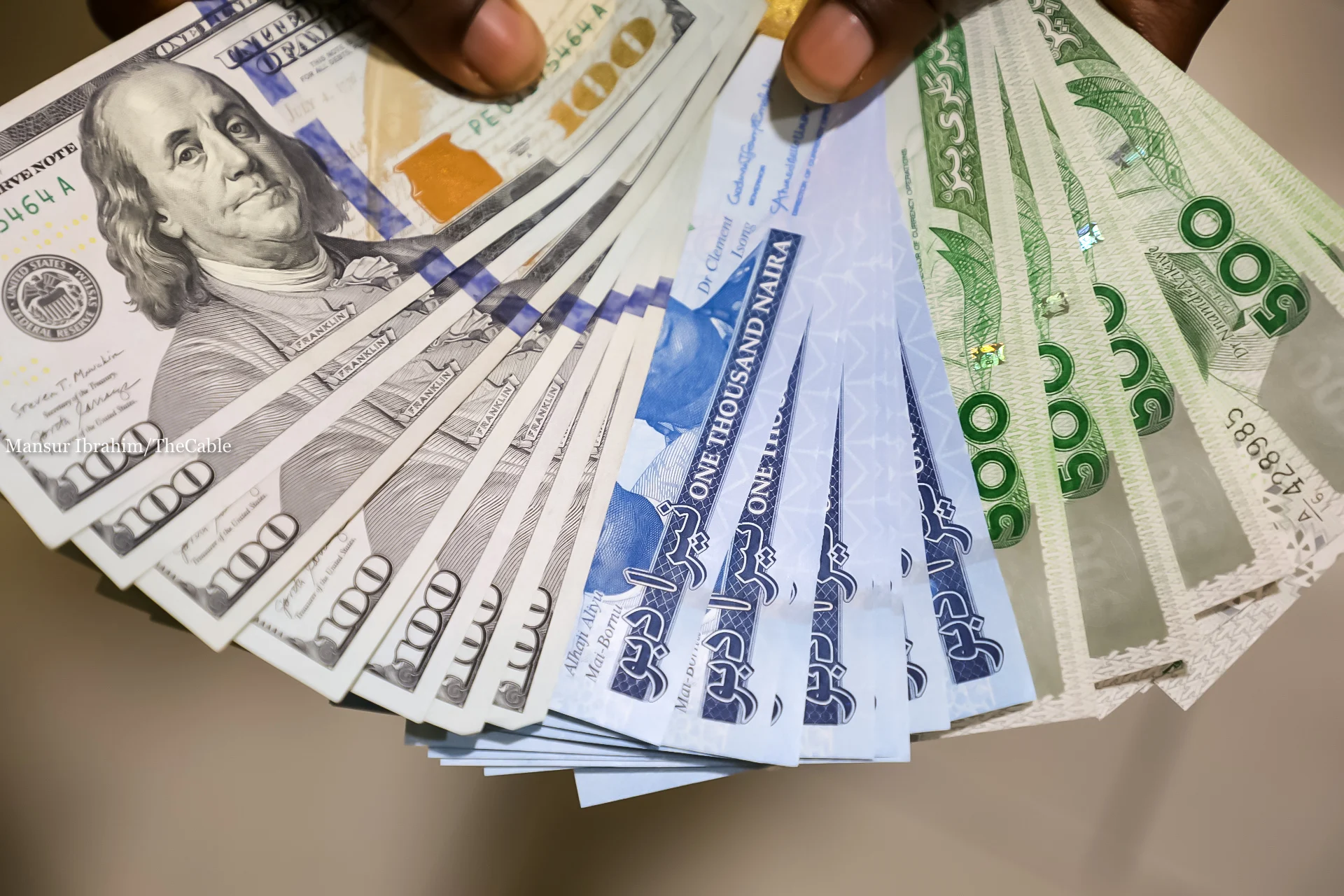The naira has maintained its downward trend after commencing trading at 1,175/$ and closed at 1,190/$ at the parallel market.
Recall on October 18, 2023, the naira had traded at 1,100/$ at the parallel market before weakened to weakened to N1160/$1 on Thursday.
It, however, appreciated slightly on the Investor & Exporter forex window after it sold at 808.28/$ at the close of trading on Friday, from 810.05/$ on Thursday, according to figures obtained from the FMDQ.
Some Bureau de Change Operators speaking on the development noted that the dollar was scarce as many did not have forex to sell to customers.
A BDC operator, Jubril Mutiu, said, “On Friday, the price was 1,175/$, but we don’t even have it. It is not available right now.”
Another BDC operator, Adamu Afeez, said, “We are looking for those to sell to us, but now, we don’t have the dollar to buy. If we don’t have one, we cannot sell.”
Another BDC operator, Ibrahim Abu, said, “We sold for 1,175/$ in the morning till afternoon on Friday. By 2 p.m., it was already selling for 1,190/$. It has been fluctuating. I don’t know what the rate will be on Monday.”
The naira had continued to maintain devaluation following the CBN’s order to the lending institutions to allow the free flow of the country’s exchange rate in June.
Before floating the naira, it traded at the official market on the FMDQ at 471.67/$ and at the parallel market at 765/$ in June.
The President, Association of Bureaux De Change Operators of Nigeria, Dr Aminu Gwadabe, said achieving stable, strong and virile exchange rate in Nigeria would require full participation of BDCs in the retail segment of the forex exchange market.
He said the challenges confronting the nation’s forex market and depreciation of the naira required cooperation from all.
The BDCs, he said, were licensed to play at the retail end of the forex market and should be fully involved in providing lasting solutions to the ongoing volatility in the exchange rate.
Gwadabe said, “The continuous depreciation of the naira in official and parallel markets does not benefit the BDCs and the domestic economy. Hence, steps should be taken to reverse the trend and strengthen the local currency for maximum economic impact.”
He said several measures by the apex bank to bridge the exchange rate gaps showed genuine intentions of the regulator to entrench exchange rate stability, but getting the BDCs involved in the solution recipe would bring the desired results of a highly liquid market and stable rates.
Gwadabe said that, like every other market segment, the market’s illiquidity remained a significant concern to the BDC sector.
He said aside from illiquidity in the market, ABCON was unhappy with the unlicensed forex dealers who were at the centre of speculative activities and attracting a negative image to the sub-sector.
Meanwhile, the price of major food items has significantly increased across several markets as Nigeria grapples with the high cost of goods and services.
The cost of filling a 12.5kg cylinder of gas increased by 44% in October 2023, selling for an average of N13,750. Also, the price of a 50kg bag of foreign rice increased by 13.5% in the same month to sell for an average of N47,850 compared to N42,000 recorded in the previous month.
Nigerians have continued to grapple with galloping food prices over the years, which has only worsened following the announcement by the federal government to discontinue petrol subsidy payments and devalue the official exchange rate.
A recent report by the National Bureau of Statistics (NBS) revealed an 18-year high headline inflation of 26.72% in the month of September, driven by the upswing in the food and core components of the inflation basket.
Specifically, food inflation (30.64%) rose to its highest level since August 2005 while core inflation (21.84%) surged to an almost 17-year high.
The hike in the cost of petrol has triggered a significant increase in the cost of transportation across the country, further impacting the selling prices of food items especially in the southern part of the country.
The surge in the cost of food items has further eroded the purchasing power of average Nigerians, considering the importance of food in the scale of household expenses. Recall that Nigerians spend an average of 56% of their household expenditure on food items.
However, with skyrocketing costs of food, transportation, and other services, Nigerians have expressed their grievances in Nairametrics latest food market survey.
The price of a 50kg bag of brown beans that used to sell for an average of N32,625 last month, rose by 22.6% to sell for N40,000.
Also, a 50kg bag of foreign rice also increased by 13.5% to sell for an average of N47,850 from the previous average of N42,000 recorded last month.
Similarly, the cost of a 25litres gallon of local palm oil rose by 16.8% to sell for an average of N27,750 from the previous average price of N23,750, while that of vegetable oil rose by 13.9% to sell for an average of N35,875 from the previous average price of N31,500.
On the flip side, the price of a carton of full chicken dropped by 21.7% to sell for an average of N22,500, from an initial average of N28,750.
In the same vein, a 450g tin of Milo now sells for an average of N3,030, indicating a 12.7% fall in price compared to an initial average of N3,480.
Charles, a gas trader at Oyingbo Market, said that the price of cooking gas increased due to supply challenges, which is an interplay between global crude oil prices, exchange rate volatility in the Nigerian market, and other logistical issues.
He expressed his fears of a further hike in the cost of petrol, and the prevailing issues are yet to be addressed.
Eunice, a gas user reacting to the development said; “I have been going to the gas station for the past 5 days, and I have not been able to purchase gas because of lack of supply. The queue was too long, and the product was very expensive, so I had to opt in for the use of a charcoal pot to cook”.
In the same vein, while interviewing another consumer at the Oyingbo Market, Madam Oke, lamented the hike in the price of food items in the market.
“Almost all the food stuff you ask for in the market has more or less doubled over the past three months. The prices are highly volatile and is affecting our purses. The government need to intervene on these continued price increases,” she lamented.


